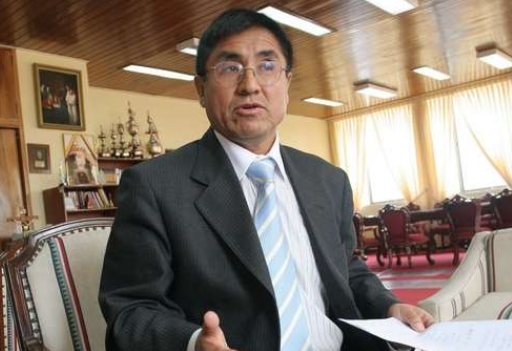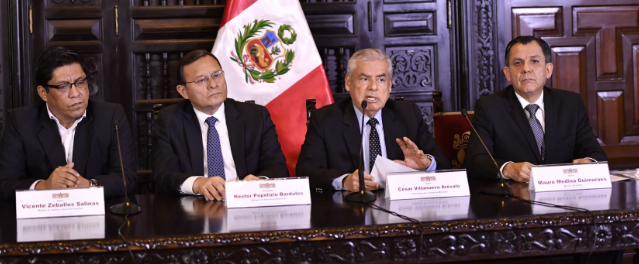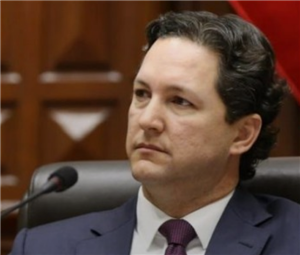 A former Supreme Court justice, Cesar Hinostroza, has been posted today at the top of the government’s most wanted list, with a price on his head of S/ 40,000 ($12,000).
A former Supreme Court justice, Cesar Hinostroza, has been posted today at the top of the government’s most wanted list, with a price on his head of S/ 40,000 ($12,000).
The judge, allegedly the leader in an organized crime network of justices and courts known as the “white collars of the port (of Callao)”, was believed to be lying low in Lima after several high profile weeks. Yesterday, however, he was reported to have crossed the border into Ecuador a week ago with the help of an immigration inspector, and fled this week to Madrid via Amsterdam. The Spanish authorities reported his arrival yesterday and have denied his request for asylum.
Hinostroza’s wife, Gloria Gutierrez, under investigation for possible money laundering in the same criminal network, flew to Madrid last week.
Since July, when Hinostroza was suspended as president of the Second Transitory Criminal Court of the Supreme Court, there has been a ban on his leaving the country, but his passport remained valid and there was as yet no warrant for his arrest.

“We will assume responsibility, we won’t wash our hands of this,” said Premier Cesar Villanueva to Congress today with his minister of Justice, Vicente Zeballos, but he stressed that the Executive’s responsibility is minor in this case. Despite being summoned to Congress to explain the failure, Villanueva made his remarks to an almost empty chamber as members of the majority Fuerza Popular and Apra parties left for lunch.
Anti-corruption prosecutor Amado Enco puts the blame squarely on the Congress, in which the majority pushed through a summary investigation into Hinostroza and before dawn on Sept. 30 voted to accuse him of the lesser crimes that would limit any conviction to a short or even suspended sentence. The constitutional accusation —necessary for the judiciary to act in cases of high-ranking authorities— then sat in the Congress for a week before it was signed by the president, Daniel Salaverry, and several more days before it was sent to the Attorney General, Pedro Chavarry, before landing yesterday morning on the desk of justice Pablo Sanchez, the former Attorney General, who is overseeing the case.
The minister of Interior, Mauro Medina, handed in his resignation to President Vizcarra yesterday as the Migrations department is under his jurisdiction, while Salaverry, who refuses to take any blame for the delays in Congress, has fired at least three congressional staff. One of the staff has complained on his Facebook page and received support from several people.

The “white collars of the port” were discovered earlier this year as the police, working on court orders, followed a number of mobile phones linked to specific criminal gangs in Callao. The investigation expanded, however, as the calls linked to a growing number of phone numbers of justices and in turn to political and business figures working a network of favors for the justices themselves and for friends and colleagues — court appointments, lighter sentences (including for rape), closing of cases, delays of other cases until the statute of limitations runs out, meetings with political figures facing investigations, plus bribes of money and perks such as World Cup 2018 tickets to Russia.
President of Congress, Daniel Salaverry, of the majority Fuerza Popular party. The investigation, however, was not moving forward until the recorded phone calls were released anonymously to investigative journalist Gustavo Gorriti of IDL-Reporteros and to Rosana Cueva of Panorama TV. Initially, Congress and some of the justices involved demanded the journalists reveal the source of the recordings.
Now in jail is Walter Rios, president of the Court of Appeals of Callao until July, plus several minor justices and district attorneys. The Judiciary is investigating not only Hinostroza but also the Attorney General, Pedro Chavarry, who used Hinostroza’s influence and political connections to bolster his election as attorney general, plus business executives with connections to the Fuerza Popular party, and a number of lawmakers with phone connections to Hinostroza.
Hinostroza, who developed most of the past 18 years of his career in the courts system in Callao, and the first ever president of the Court of Appeals of Callao to be elected to a second term, is signaled clearly as the leader in the network.





